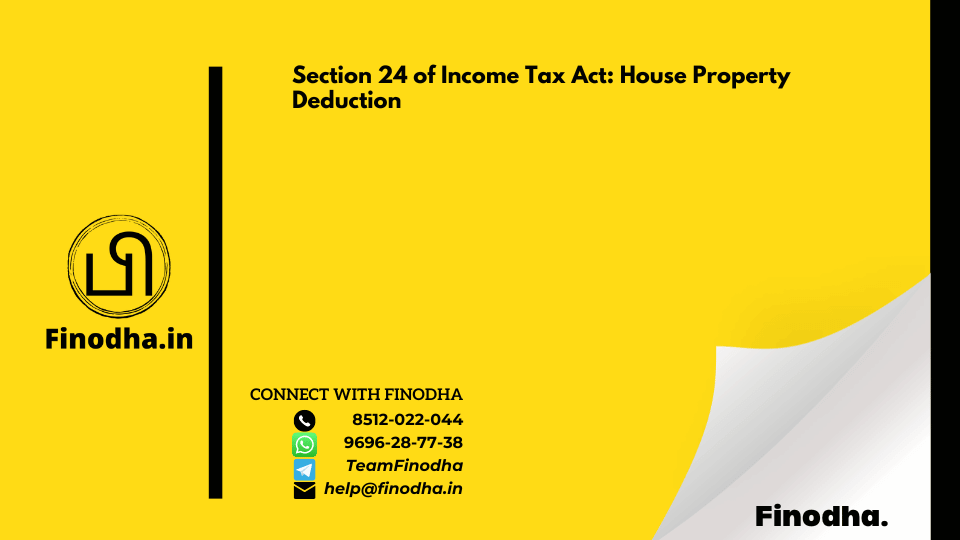Important Keyword: Income from House Property, Income Tax, Section 24.
Table of Contents
Section 24 of Income Tax Act: House Property Deduction
In recent decades, India has experienced a remarkable and consistent trajectory of economic growth. With a vision to attain developed nation status by its centennial year of Independence, the country is steadfast in its pursuit of progress on multiple fronts. Among the key pillars of this development agenda is ensuring access to affordable housing for all citizens. Recognizing the pivotal role of housing in the nation’s advancement, the government has introduced various measures to provide relief, including tax incentives outlined in Section 24 of the Income Tax Act.
These tax breaks serve as essential tools in promoting homeownership and bolstering the real estate sector, which is integral to fostering economic growth and societal well-being. By offering deductions on home loan interest payments, particularly for first-time homebuyers, Section 24 encourages investment in residential properties. This not only addresses the pressing housing shortage but also elevates living standards and supports sustainable urban development nationwide.
The benefits of these tax breaks extend beyond individual homeowners, stimulating demand in the housing market and driving construction activity. Consequently, this spurs job creation and economic activity in related sectors, contributing to overall prosperity and socio-economic development.
In essence, Section 24 of the Income Tax Act underscores the government’s commitment to ensuring equitable access to housing opportunities for all segments of society. By leveraging tax incentives to promote affordable housing, India takes significant strides towards achieving its vision of becoming a developed economy by its 100th year of Independence.
Income from House Property
The Income Tax Act mandates that the annual value of any property, including buildings or land owned by an individual, is subject to taxation under the head “Income from House Property.” This taxation framework encompasses three main scenarios:
- Income from Let-out House Property: When the property is rented out to tenants, generating rental income for the owner.
- Income from Deemed Let-out House Property: This applies when an individual owns more than two properties, even if they are not rented out. The additional properties are deemed to be rented out, and their potential rental value is taxable.
- Self-Occupied Property: If the property is occupied by the owner for residential purposes, its annual value is considered as nil for taxation purposes.
To qualify for taxation under the head “Income from House Property,” certain conditions must be met:
- The taxpayer must be the legal owner of the property.
- The property should not be utilized for business or professional purposes. If it is used for such activities, it falls under a different tax category, “Income from Business or Profession.”
- Income from House Property is taxable in the hands of the legal owner, defined as the individual who can exercise ownership rights independently.
By adhering to these guidelines, taxpayers can ensure compliance with the provisions governing the taxation of income from house property, thereby fulfilling their obligations under the Income Tax Act.
Under Section 24 of the Income Tax Act, there are two types of deductions applicable to house property:
Standard Deduction:
- Standard Deduction is set at 30% of the Net Annual Value of the property.
- This deduction is applicable regardless of the actual expenses incurred by the taxpayer on insurance, repairs, electricity, water supply, etc.
- In the case of a self-occupied house property where the Annual Value is Nil, the standard deduction is also zero for such a property.

Interest on Home Loan
Interest paid on loans taken for the acquisition, construction, repairs, renewal, or reconstruction of a house property can be claimed as a deduction. Additionally, Section 80C benefits are applicable to the principal amount of the loan in the case of residential house property.
For self-occupied house properties where the owner or their family resides, they can claim a deduction of up to INR 2 lakh on the interest paid for their home loan. The same deduction applies even if the house property is vacant. However, if the house property is let out for rent, the entire interest amount is allowed as a deduction.
There is a limit of INR 30,000 on the deduction if the following criteria are not met:
- The home loan must be taken for the purchase and construction of a property.
- The loan is taken on or after 1st April 1999.
- The purchase or construction is completed within 5 years from the end of the financial year in which the loan was taken.
- An interest certificate is available for the interest payable on the loan.

Pre-Construction Interest
Pre-construction interest refers to the interest paid on a housing loan while the house property is still under construction. It is an essential aspect to consider when claiming deductions on a home loan for purchase or construction purposes.
Here are some key points to remember before claiming pre-construction interest:
- Pre-construction interest cannot be claimed for a loan taken for repairs or reconstruction of the house.
- The total amount of pre-construction interest, along with interest on a housing loan, that can be claimed for a particular year cannot exceed INR 2 lakhs.
- The deduction for pre-construction interest is allowed in 5 equal installments, starting from the year when the construction completes.
Let’s illustrate this with an example: Ms. Hawa took a loan of INR 5,00,000 for property construction on 1st October 2020, with an interest rate of 10% per annum. The construction was completed on 30th June 2021. Here’s how the interest deduction under Section 24 would be calculated:
- Pre-construction interest: 10% of INR 5,00,000 for 6 months (from 1st October 2020 to 31st March 2021) = INR 25,000
- Pre-construction interest is allowed in 5 equal installments of INR 5,000 each, starting from the completion of construction, i.e., in the assessment year 2021-2022.
- Interest for the year (1st April 2021 to 31st March 2022) = 10% of INR 5,00,000 = INR 50,000
- Therefore, the total interest deduction = INR 50,000 + INR 5,000 = INR 55,000
How to determine Income from House Property?
Let’s calculate the Income from House Property for Akash under both scenarios:
Scenario 1: House Property is Self-Occupied
Annual Value of the property = Nil (since the property is self-occupied) Deductions under Section 24: Standard Deduction = 30% of the Net Annual Value = 30% of Nil = Nil Interest paid on the home loan = INR 2.5 lakhs Total Deduction = INR 2.5 lakhs Income from House Property = Nil – INR 2.5 lakhs = (-) INR 2.5 lakhs
Scenario 2: House Property is Let Out
Annual Value of the property = INR 80,000 Deductions under Section 24: Standard Deduction = 30% of the Net Annual Value = 30% of INR 80,000 = INR 24,000 Interest paid on the home loan = INR 2.5 lakhs Total Deduction = INR 24,000 + INR 2.5 lakhs = INR 2,74,000 Income from House Property = INR 80,000 – INR 2,74,000 = (-) INR 1,94,000
In both scenarios, the Income from House Property results in a loss, indicating that Akash can set off this loss against other heads of income such as salary or business income, thereby reducing his overall tax liability.
| Type of Property | Self Occupied | Let Out |
| Gross annual Value (Rent paid) | NIL | 80,000 |
| Less: Municipal Taxes or Taxes paid to local authorities | NA | 5,000 |
| Net Annual Value (NAV) | NIL | 75,000 |
| Less: Standard Deduction(30% of NAV) | NA | 22,500 |
| Less: Interest on Housing Loan | 2,50,000 | 2,50,000 |
| Less: Pre-construction interest (1/5th of 2 Lakhs) | 40,000 | 40,000 |
| House property Income | (2,90,000) | (2,37,500) |
| Deduction Allowed | (2,00,000) | (2,37,500) |
In the case of a self-occupied property, the maximum deduction allowed for interest on a home loan is capped at INR 2,00,000 per financial year. However, for a let-out property, you can claim the entire amount of interest paid on the home loan as a deduction, without any upper limit. This means that if the interest paid exceeds INR 2,00,000 for a let-out property, you can still claim the entire amount as a deduction while calculating the income from house property.
Read More: Clubbing of Income under Section 64
Web Stories: Clubbing of Income under Section 64
Official Income Tax Return filing website: https://incometaxindia.gov.in/




